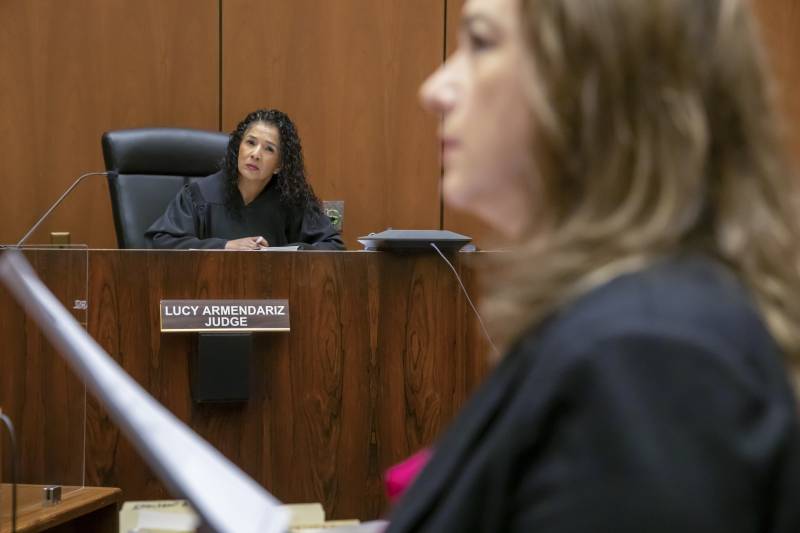For the past few years, San Francisco’s international reputation as a vibrant and scenic destination for tourists and conventions has been overtaken by a drumbeat of stories focused on homelessness, an epidemic of fentanyl overdose deaths and people with severe and untreated psychoses living on the streets.
San Francisco to Implement Newsom's CARE Court Plan to Treat Severe Mental Illness

Now, San Francisco is poised to be among the first eight counties in California this year to implement CARE Court, a new approach to treating severe mental illness that Gov. Gavin Newsom calls a “paradigm shift,” but which supporters and opponents alike fear will fail to deliver on its sweeping promises.
Supporters of the program, like Mayor London Breed, said it’s time for the city to undergo a course correction.

“We’ve got to start having honest conversations about the fact that things are changing, and it is not OK to allow what’s happening on the street to happen on the streets,” she recently told KQED.
The new courts — CARE stands for Community Assistance, Recovery and Empowerment — will allow first responders, family members, clinicians and others to ask a judge to order treatment plans for people diagnosed with schizophrenia and other psychotic disorders. While not limited to people who are also experiencing homelessness, the program focuses on people who are not currently receiving mental health treatment. Every county in California will have to implement the new civil courts by 2024.
Participation is voluntary, but supporters hope the so-called “black robe effect” — where people ordered to do something by a judge feel compelled to do so — will increase compliance.
Opponents of the program, including the American Civil Liberties Union and Disability Rights California, have argued that people, particularly Black Californians, will be targeted to enter the program because Black residents are overrepresented in both the number of people experiencing homelessness (PDF) and the number of people diagnosed with psychotic disorders.
Johnny Crawford, who works on a cleaning crew in San Francisco, said he shared those concerns.
“I have mental health issues and I’ve dealt with addiction,” he said. “I think trying to push somebody into doing something they don’t want to do, it’s not fair. It’s not right. I wouldn’t do it.”
Supervisor Rafael Mandelman said those civil liberty concerns were being trumped by a larger concern: how to get people who aren’t engaged in mental health services into treatment.
“There are certainly folks on the Board of Supervisors and there are certainly people in the broader ballot body politic who really don’t want to see any more coercion of people into care who are not voluntarily seeking it,” Mandelman said, adding, “There’s a larger group of people who want these problems solved and want to see people get care.”
Supporters argue a treatment plan developed through CARE Court will be less restrictive than alternatives, such as state hospitalization or conservatorship.
To qualify, an individual must be 18 years or older, diagnosed with schizophrenia or another psychotic disorder, deemed likely to benefit from a supervised treatment plan and found to be at risk of harming themselves or others.
A recent analysis by the Benioff Homelessness and Housing Initiative at UCSF and the California Policy Lab found that, based on data from hospital emergency rooms and the criminal justice system, upwards of 760 people in San Francisco might be eligible for referral to CARE Court when the program begins in October. Some experts expect the number to be more than 1,000.
Ensuring counties have enough funding to run the new CARE Courts is a concern shared by critics and supporters alike. Among the agencies involved in implementing CARE Court will be the Superior Court, the Department of Public Health, the Human Services Agency, the Department of Homelessness and Supportive Housing, the City Attorney’s Office and the Public Defender’s Office.
San Francisco City Attorney David Chiu said each participant will be required to go through five court hearings before a treatment plan is approved. But, he said, the state hasn’t allocated any additional funds for that.
“In addition to the work our office is going to do, there’s the work of, say, public defenders and other advocates, work of the court itself. And all of these actors are going to need additional resources,” Chiu said.
And, once someone has a treatment plan in place, San Francisco social worker Charlie Berman said, it isn’t clear whether the city’s existing facilities will be able to absorb new patients. For the past decade, Berman has worked on the streets of San Francisco with people suffering from severe mental illness — exactly the population CARE Court targets.
“I think CARE Court really isn’t going to do much of anything more than the existing programs we have, because those existing programs are already not really able to do their job as well as they should due to lack of capacity,” he said. “And that means so many people who are cycling in and out of the [psychiatric] emergency room aren’t getting inpatient services because half the people at S.F. General [Hospital] are awaiting placement.”
Supervisor Hillary Ronen is frustrated and worried that CARE Courts will simply shift attention and funding away from other programs aimed at helping the city’s unhoused population, including those with serious mental illness.
“It’s not the design of CARE Court that I have a problem with,” she said. “It’s the constant diversion of attention and strategies and the inability to just stick with one strategy and see it through.”
Ronen added, “Overall, the diversion from everything that we were already doing in San Francisco towards implementing CARE Court is a net negative for the city.”
Breed — who may ultimately be held accountable for the success or failure of the program — dismisses those concerns.
“There’s never enough money for anything. Period. But the fact is that can’t be an excuse for not trying,” she said. “People are sick and tired, and we have to clean up the streets.”
